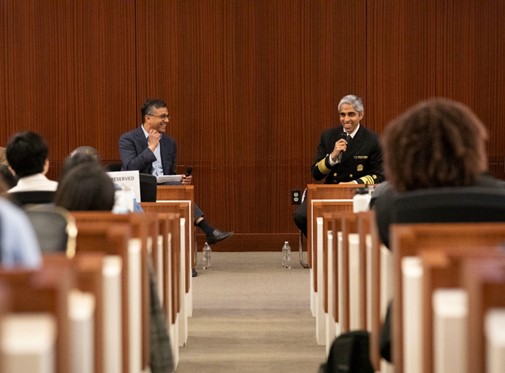Photo credit: Christian Hopkins
On April 8, the Hopkins Medicine Distinguished Speaker Series welcomed Vivek Murthy, the 19th and 21st surgeon general of the United States, for a wide-ranging discussion. The event, titled “A Conversation with Dr. Vivek Murthy, United States Surgeon General,” was moderated by Allen Kachalia, senior vice president for patient safety and quality at Johns Hopkins Medicine.
Established by medical students, the speaker series aims to expose the Johns Hopkins community to innovative ideas from renowned leaders who have inspired the world with their unique perspectives and experiences. Previous events have featured Nobel laureates, MacArthur “Genius Award” recipients and trailblazers from various fields.
Murthy’s Path to Public Service
As the nation’s top doctor, Murthy has been at the forefront of advancing public health initiatives and promoting the well-being of all Americans. He oversees the U.S. Public Health Service Commissioned Corps, comprising over 6,000 public health officers dedicated to caring for underserved and vulnerable populations.
During the discussion, Murthy reflected on the pivotal experiences that ignited his commitment to medicine and public service. He delved into the numerous challenges and tough decisions he has faced before and during his tenure as surgeon general. He also outlined the key priorities he set upon his appointment, emphasizing the proactive measures necessary to advance the nation’s health.
Addressing Urgent Public Health Matters
The conversation covered several critical public health issues that Murthy has prioritized during his tenure:
- Social Media’s Impact on Youth Mental Health: Murthy shared his perspective on how social media influences community, isolation and mental health challenges, especially among young Americans. He discussed the potential long-term effects and strategies for mitigating these impacts.
- The Loneliness Epidemic: Loneliness has far-reaching consequences on physical and mental well-being. Murthy discussed the role health care providers can play in addressing this growing epidemic and promoting social connectedness.
- Restoring Public Trust: In the digital age, the spread of misinformation about health and medicine has become a major concern. The COVID-19 pandemic also highlighted the issue of public distrust in medical authorities. Murthy acknowledged this challenge and discussed strategies for rebuilding trust by fostering open dialogue between health care providers and the public.
Inspiring the Next Generation of Health Leaders
Moderated by Kachalia, Murthy’s longtime friend, the conversational event allowed Murthy to share his unique experiences leading at the highest levels of public health and government. He reflected on the qualities and skills that facilitated his success, such as effective collaboration, open-mindedness and empathy.
Murthy also discussed lessons learned along the way, offering valuable advice for aspiring health leaders and medical trainees. He emphasized the importance of developing a diverse skill set, including strong communication abilities, critical thinking and a commitment to lifelong learning.
The discussion not only shed light on urgent health issues, but also inspired the next generation in medicine and public health. Murthy’s emphasis on engaging with communities serves as a fundamental step in understanding and addressing public health challenges, underscoring his commitment to nurturing a dialogic, trusting relationship with the public. As the event’s attendees listened attentively to him, he reminded them, wisely, to listen to all.
Related Content
- On How and Why Science Is Political
- Global Threats to Public Health: Dr. Peter Hotez on Climate Change, Conflicts, Poverty and Antiscience
- Breaking Down Where the Money Goes: Personal and Public Health Care Spending in the United States
Want to read more from the Johns Hopkins School of Medicine? Subscribe to the Biomedical Odyssey blog and receive new posts directly in your inbox.
